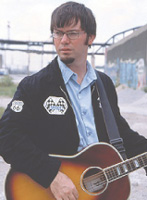home | north bay bohemian index | music & nightlife | preview

Front man: Jay Farrar of Son Volt and Uncle Tupelo has re-energized Americana music.
High Voltage
Son Volt recharge their rock 'n' roll roots
By Greg Cahill
'Feels like driving around in a slow hearse," Son Volt head honcho Jay Farrar laments on "Slow Hearse," the spooky elegy that kicks off the band's new CD, The Search. It's a masterful song. Farrar repeats that one line over and again for over two minutes accompanied by little more than a haunting upright piano and a backward-tracked electric guitar, and he never sounds maudlin.
Then the band bursts into "The Picture," soul horns blaring in stark contrast to Farrar's bleak lyrics about war, governmental indifference and the saving grace of mercy.
The slow hearse careens through the detritus of a crumbling empire.
The explosive rock sonics belie the jaunty alt-country Farrar helped pioneer during the late '80s in the seminal Americana band Uncle Tupelo and a decade ago in the first incarnation of Son Volt. Ask him about this follow-up to Son Volt's brilliant 2005 comeback album Okemah and the Melody of Riot, and the conversation turns to soundscapes and musical styles and the cohesiveness of the band he reconstituted after legal wrangling waylaid the original lineup two years ago.
"Overall, The Search is more reflective of the growing coalescence of the band and of the members playing off of each other," he explains during a phone interview from a rehearsal studio a short distance from his St. Louis home. "I think Okemah was more reflective of the political turmoil that is going on around us," he adds. "The political slant to the songs is still there. But I didn't want it to be the real focus for this record. Even though there are some topical themes, I tried to steer away from that. But it still pops up in songs like 'The Picture.'"
As one-third of the seminal alt-country outfit Uncle Tupelo, Farrar tapped both the hillbilly spirit and Neil Young's Zuma-vintage grunge, fusing the simple heartfelt sentiments of traditional music with the fire of punk. Their angst-ridden twang informed the band's 1990 debut No Depression, which took its title from an old Appalachian spiritual and lent its name to the rootsy Americana sound that characterized the alt-country movement as well as the Seattle magazine that still chronicles its biggest stars.
The band recorded four albums, including 1993's masterwork Anodyne, before parting acrimoniously. After its 1994 split, Uncle Tupelo's members formed two more revered underground bands: Farrar and drummer Mike Heidern spun off the tradition-bound Son Volt, while Jeff Tweedy enlisted the rest of the band to form the experimental pop band Wilco.
The following year, joined by the brothers Jim and Dave Boquist and fueled by Farrar's soul-searing electric guitar work, Son Volt released their critically acclaimed debut Trace. It captured Farrar's raw, dark side. Two more albums followed before the band members soured on each other. Farrar went on a hiatus. In 2001, he reemerged with his solo debut, Sebastopol, releasing three more solo projects in the next three years, mostly under the radar.
In 2005, he reunited the original Son Volt lineup to record "Sometimes" for the Alejandro Escovedo tribute album Por Vida. A new CD project appeared likely, but the old animosities resurfaced.
"The other guys decided they only wanted to talk through their lawyers," Farrar recalls.
So he recruited a new band: guitarist Brad Rice of the Backsliders, bassist Andrew DuPlantis of the Meat Puppets and drummer Dave Bryson of Damnation A.D. Amid the backdrop of the mounting bloodshed in Iraq and the shame of the neglected Gulf Coast, Okemah and the Melody of Riot struck a chord, thanks to such anti-Bush fare as "Jet Pilot" and "Endless War."
The All Music Guide lauded the results as Farrar's best since Trace.
The Search, augmented by Eric Heywood on pedal-steel guitar and Derry deBorja on organ, builds on those themes of political strife and social isolation. It's not so much a concept album as a pungent distillation of the melancholy and longing that inhabit so many of Farrar's best songs. Some are autobiographical, some are character sketches, some are observational tomes. But all tell of road-weary travelers searching for meaning amid broken dreams, political turmoil and social tumult.
Call them reports from the heartland, glimpsed from a slow hearse.
Son Volt perform Saturday, March 31, at the Mystic Theatre. Magnolia Electric Company open. 21 Petaluma Blvd. N., Petaluma. 9pm. $20; 18 and over. 707.765.2121.
Send a letter to the editor about this story.
|
|
|
|
|
|